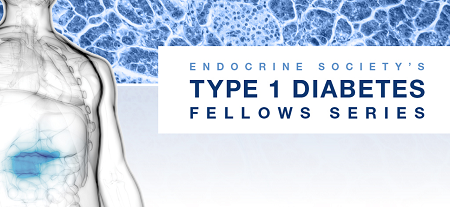
The 13th Annual Endocrine Fellows Conference: Type 1 Diabetes Care and Management provides advanced support to endocrine fellows as they begin their careers as practicing clinicians and diabetes experts. The in-person and online resources include engaging and comprehensive education as well as career development opportunities for building knowledge, practical skills, and a lasting network of colleagues.
The application deadline is Saturday, February 7, 2026.
Have questions? Please contact [email protected] for assistance.
As in years past, the Type 1 Diabetes Fellows Program will have three core components:
Upon successful completion of these educational initiatives, participants should be better able to:
The in-person program will take place at ENDO 2026 in the McCormick Place West Center, Chicago, IL. (All times are Central Time) (Subject to change)
| 5:00 – 6:00 PM | Check in and Networking Reception |
| 6:00 – 7:00 PM | Device Demos |
| 7:00 – 8:00 PM | Dinner |
| 8:00 – 8:45 PM |
Keynote Address |
| 8:45 – 9:00 PM | Q&A |
Friday, June 12, 2026
| 7:00 – 8:00 AM | Registration and Breakfast with the Faculty |
| 8:00 – 8:15 AM | Welcoming Remarks from Program Chairs |
| 8:15 – 9:00 AM | Diabetes Technology Session #1: CGM with Closed Loop |
| 9:00 – 9:45 AM | Diabetes Technology Session #2: Updates on Insulin Treatment |
| 9:45 – 10:30 AM | Diabetes Technology Session #3: Diabetes in Pregnancy |
| 10:30 – 11:00 AM | Break & Questions for Industry Representatives |
| 11:00 AM – 12:00 PM | Small Group Discussions - AM Session |
| 12:00 – 1:00 PM | Lunch with Faculty |
| 1:00 PM – 1:45 PM | Session #4: Adjunctive Therapies |
| 1:45 – 2:30 PM | Session #5: Immunotherapies for Type 1 Diabetes |
| 2:30– 3:00 PM | Break & Questions for Industry Representatives |
| 3:00 – 4:00 PM | Small Group Discussions - PM Session |
| 4:00 – 4:30 PM | Closing Comments |
All individuals traveling from outside the United States must apply for entry visas as soon as possible and at least four months prior to the date of travel for ENDO 2026. The most updated information may be found at the US State Department site. Scientists visiting the U.S. may find helpful information at The National Academies of Sciences website. Visa appointment wait times can be found here.
Please do not wait until ENDO 2026 registration opens in February 2026 before applying for a visa. All visitors traveling to the U.S. from visa waiver countries (i.e., Europe, Japan, Australia, etc.) must meet all requirements. If you need more information on the Electronic System for Travel Authorization (ESTA) or a list of visa waiver countries, click here.
To request a visa invitation letter or learn more, visit the Visa Information page.